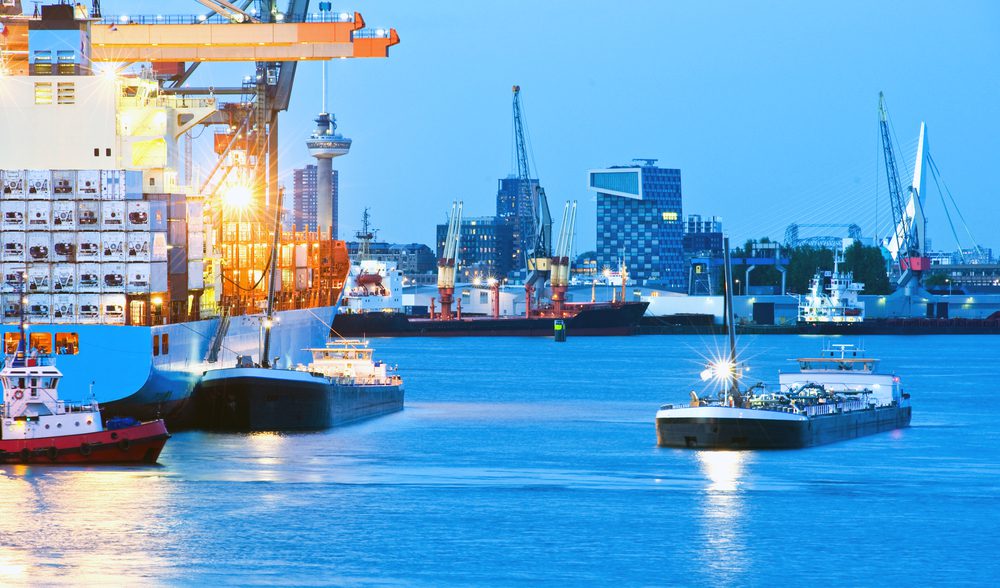File Photo: Bunkering vessels in Rotterdam. Corepics VOF / Shutterstock
 By Ahmad Ghaddar and Julia Payne LONDON, Nov 2 (Reuters) – The world’s biggest oil traders are gearing up to cash in on big disruptions that could hit the shipping fuel market in just over a year due to new U.N.-mandated environmental rules.
By Ahmad Ghaddar and Julia Payne LONDON, Nov 2 (Reuters) – The world’s biggest oil traders are gearing up to cash in on big disruptions that could hit the shipping fuel market in just over a year due to new U.N.-mandated environmental rules.
International Maritime Organization (IMO) regulations will cut the limit for sulphur in marine fuels globally from 3.5 percent to 0.5 percent from the start of 2020.
“We’re going to hopefully facilitate the new rules in 2020 by helping out the industry and the participants in general to have a reasonably smooth transition,” Marco Dunand, the chief executive of trading house Mercuria, told the Reuters Global Commodities Summit.
He said Mercuria was in talks to finance shipowners who want to install expensive sulphur cleaning kits called scrubbers, allowing them to burn cheaper high sulphur fuel. He declined to name those clients.
The company is offering a package that would include providing compliant fuels via its subsidiary Minerva as well as fuel-price hedging.
Traders are widely expected to benefit as they thrive off efficiently moving products between regions with price dislocations.
But the market currently lacks a benchmark for the new compliant fuel grade.
“There are legitimate concerns about this product being available in multiple locations,” Vitol Group Chief Executive Russell Hardy told the summit.
He added that planning for the changes in the absence of a futures market was complicating matters. “It’s doable but we would like a bit of transparency,” he said.
While S&P Global Platts, the agency that publishes benchmark physical fuel oil price assessments, plans to launch a set of new 0.5 percent sulphur prices starting in January, a paper market does not yet exist.
“I think it will be a bit chaotic in the beginning of 2020 … (but) we don’t think it’s going to be extremely disruptive,” Gunvor CEO Torbjorn Tornqvist told the summit.
Other winners from the changes will be complex refineries that have invested in the right kit to turn high-sulphur products into low-sulphur, or sweet, ones.
This leaves simple refiners that can’t easily clean sulphur from petroleum products at a risk of losing out.
Shipowners, on the other hand, could be facing an extra $30 billion in fuel costs in 2020, according to a base case scenario from consultancy Wood Mackenzie. This compares with a total global shipping fuel bill of roughly $100 billion today.
SCRUBBERS
Vitol sees 3,000-4,000 scrubbers installed around the 2020 implementation date, a number that means high sulphur, or heavy, fuel oil is expected to remain in demand. Vitol has opted to install scrubbers on its bigger ships.
“It’s not the amount of scrubbers you do, but on which ships because the majority of bunker fuel that is consumed today goes on 20-30 percent of the global fleet,” Tornqvist said.
As such, Gunvor, which has also invested in some scrubbers, believes there will still be demand for heavy fuel oil, as scrubber uptake increases through 2020 and 2022.
Vitol expects around 750,000 barrels per day (bpd) of middle distillates to go into the 3 million bpd bunker pool to make the new product. That equates to about 2.5 percent of the entire 30 million bpd distillates market, Hardy said. He added this transition could be achieved with the right price incentives.
Tornqvist said the future price difference of around $40 a barrel between gasoil and heavy fuel oil gave “an extreme incentive to install a scrubber”.
Follow Reuters Summits on Twitter @Reuters_Summits
For more summit stories, see (Editing by Mark Potter)
(c) Copyright Thomson Reuters 2018.

 Join The Club
Join The Club











